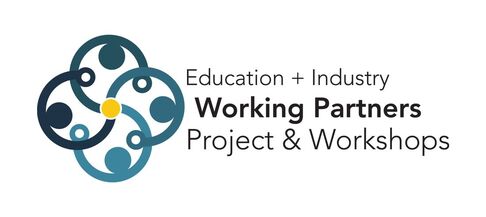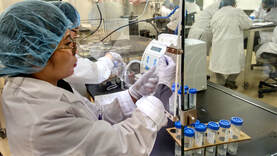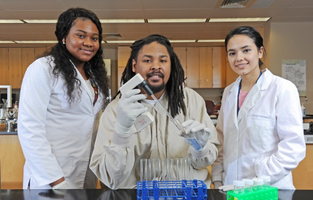|
InnovaBIO & STUDENTFacturED
Salt Lake Community College
Key Outcomes
- Provided students with campus-based opportunities to work with real clients on real-world projects
- Allowed students to gain experience while earning course credits
- Increased demand for program's work-ready graduates
- Supported regional economy by providing low-cost, low-risk, quality controlled bio manufacturing environment staffed by supervised student-technicians
- Increased industry equipment and software donations
- Targeted business recipients of NSF SBIT Phase II grants looking for community college partner
Summary

InnovaBio®, a contract research organization, and STUDENTfacturED®, a contract manufacturing organization, were developed by the Salt Lake Community College (SLCC) biotechnology program as a means by which students could receive real-world technical and business experience while completing their studies.
|
InnovaBio®, a student program focused on conducting research for outside entities, was established in 2005 to primarily serve biotech companies in the Salt Lake and Utah Valleys by providing industry with access to skilled research as performed by supervised students in SLCC's biotech program while students benefit from working on real-world research projects. InnovaBio® typically arranges formal partnerships with 5-6 companies per year under formal agreements made explicit through the use of SLCC-approved contracts; it also accepts clients who are non-profits, such as the Living Planet Aquarium. Additionally, InnovaBio® actively seeks out companies who have received NSF-funded SBIR Phase II grants; these awardees are eligible for supplemental funding up to $40,000, of which 75% must go to community colleges for contract work thus making them natural InnovaBio partners. |
"The main three benefits for industry with InnovaBio are that we provide high quality R&D that is low cost, low risk, and the IP is all theirs. The low cost is the most attractive but the other two ease their minds, because that’s something they think of right away: Am I going to have to share IP with the college?" --Mary Nelson, PI |
|
While students clearly benefit from the experience of working on "real" projects, industry partners in the InnovaBio® program also benefit in several ways. As they are only invoiced for consumables, the costs are low. They also experience less risk; contract terms minimize liability and confidentiality exposure. Lastly, the industry partners retain complete ownership of their intellectual property as SLCC explicitly releases any claims to IP rights of any kind.
|
The STUDENTfacturED® enterprise, a contract manufacturing organization, focuses less on research and design and more on building business skills. Developed in response to employers seeking employees who understood how to work in the biomanufacturing environment, the STUDENTfacturED® lab was developed to provide students with hands-on experience in many aspects of a manufacturing workplace including following protocols, working in an FDA-regulated environment, quality control, quality assurance, marketing, design controls for new products, and lean manufacturing.
|
STUDENTfacturED® products are targeted for use at educational institutions, inspiring the tagline, “made by students, for students”. Currently three products are offered: a simple DNA extraction kit, a series of plasmids for use in the introductory courses, and agar plates/slants for use in SLCC Microbiology classes. New product development and continuous improvement projects are part of the typical curriculum for students. As a part of the concurrent curriculum, STUDENTfacturED uses a dual enrollment model that requires participating faculty to do a project at the end of their introductory course using their products. This helps the enterprise predict needs for future partnerships and product solutions.
|
|
"Job placement has been very high; employers call us first when looking for experienced hires. Contracted clients have also donated several thousand dollars’ worth of equipment and software." --Mary Nelson, PI |
In most cases, companies and educational institutions approach the programs to initiate partnerships. Potential partners hear about the program largely by word-of-mouth, either from existing partners in similar industries or through faculty connections at the college and, regardless of how the relationship is formed, the goal for SLCC is always to partner with companies that will enhance the students’ learning experience. Additionally, the two programs have been able to use partner donations and various funding streams to improve student access to cutting-edge materials and equipment, providing the opportunity for students to conduct their projects in an environment that closely resembles that found in industry and making them more appealing as new employees upon graduation and sustaining their job placement at higher levels. |
Of course, no venture is without its challenges. While the program enjoyed the support of the college administration overall, periodic conflicts arose regarding program costs, the use of the grant funding, and program management, while staff and faculty changes impacted the program’s management and continuity. Additionally, and even with the funding and donations, the program is very expensive due to the professional-grade equipment, materials, and safety measures required, as well as the need to ensure everything stays current. As such, getting a sufficient number of students enrolled to justify the cost can be difficult, especially given that the realm of “biotech” is foreign to many potential students. It is only recently that the program’s outreach coordinator has made headway with high school counselors with the idea of the industry and the program can be introduced to potential recruits sooner. There have also been issues with some companies putting too much pressure on students to complete projects quickly, which is not always possible since the students have other academic responsibilities. This has largely been resolved by disallowing direct contact between the companies and students, and by developing better contracts that work for the students, the college, and the companies.
Impacts
- Increased graduate employability
The InnovaBIO/STUDENTfacturED program is industry-focused and provides real-world, hands-on training for students, that in turn makes graduates desirable hires. Graduates also have found that their resulting job placements are sustained at high levels. - Support for regional industry and small businesses
Partners from the industry and business sectors obtain low-cost, low-risk results given that they retain the IP rights and are not charged for staff costs.
- Improved program management
Gaps in graduates' skills and knowledge were identified by surveying former students in entry-level industry jobs and their employers. This informed adjustments to the program to better prepare students with work-ready skills.
- Additional program resources
The program received donations of equipment and software from industry partners, allowing them to stay up-to-date with industry standards. Any surplus revenue generated by the program was set aside for student scholarships.
Challenges
- Ensuring adequate enrollment to meet increased costs
Biotechnology programs often face challenges with student recruitment; SLCC's program is no exception. As a result, a critical and continual challenge is the justification of additional program expense, exacerbated by the fact that InnovaBIO/STUDENTfacturED costs more than most of SLCC's other programs.
|
- Keeping equipment current
Industry-relevant processes and services are necessary to bring industry to the table. However, keeping the lab's equipment and supplies current with industry trends can require costly updates. - Securing and sustaining administrative support
The college’s administration was in support of the program, yet difficulties with program costs, grant funding, and partnerships periodically arose. Faculty and staff changes also impacted the program’s management and leadership.
Implementation Strategies
|
"Our best industry partners are established companies with back burner/low priority projects. It is also important that we work with scientists rather than executives. Scientists understand the slow pace of learning to do science and the uncertainty of outcomes from the work." Mary Nelson, PI |
- Secure and diversify funding sources
InnovaBIO/STUDENTfacturED were able to secure federal funding for the portion of the program that focused on the study of microbiomes. The program also received state funding to purchase materials; had the program not utilized this funding in particular, it would not have otherwise been used. - Use data to recruit industry partners
The program approached potential industry partners with hard data and specific examples, as well as plans for relationship contracts, to make the benefits of partnership clear. Reaching out to grantees with letters describing the program and their equipment also proved useful in attracting new industry partners.
Additional Resources
Subject Information
|



